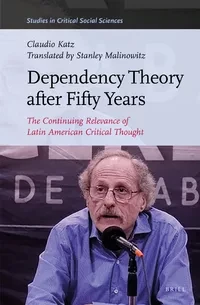Dependency Theory After Fifty Years – The Continuing Relevance of Latin American Critical Thought

Blurb
This book received the Libertador Prize for Critical Thought (2018), demonstrating a renewal of interest in Dependency Theory. That conception initially included distinct forms of Marxism, liberalism, and developmentalism that should be differentiated, despite sharing the same name. The later retreat of that approach contrasts with the growing present-day relevance of its postulates; Latin America bears the effects of dependency even more acutely than in the past, making it imperative to understand the logic of its peripheral subordination. Dependency Theory in its original form is insufficient for explaining contemporary reality; it must be updated to interpret the current modalities of dependent capitalism. This book offers analytical clues to that reinvention.
This book ist part of the alternative reading list 2022 by Diversifying and Decolonising Economics (D-Econ). The editors comment has been provided by D-Econ and can also be found on the list, which was compiled by Devika Dutt, Danielle Guizzo, and Ingrid Kvangraven.

